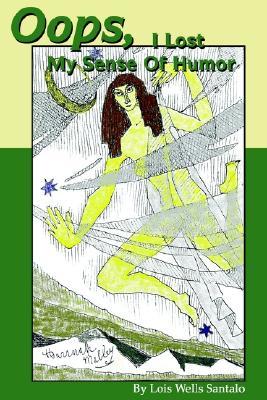Author: Lois Wells Santalo
Title: Oops, I Lost My Sense of Humor
Publisher: iUniverse
ISBN: 9780595258406
Pages: 172, Paperback/Hardcover
Genre: Memoirs/Non-Fiction
Author Interview with Lois Wells Santalo
 Author Interview Lois Wells Santalo
Author Interview Lois Wells Santalo
Oops, I Lost My Sense of Humor
Interviewed by: Tamar Mekredijian, Pacific Book Review
Today we have the pleasure of being with author Lois Well Santalo to discuss her book Oops, I Lost My Sense of Humor. Thank you, Ms. Santalo, for taking your time to be with us.
LWS: My pleasure, Tamar
PBR: You first published your book, “Oops, I Lost My Sense of Humor,” in 2002. What made you decide to add to it and publish it again?
LWS: It’s such a scary, helpless feeling to be diagnosed with cancer, and it’s happening to so many people these days. I wanted to let people know that cancer is no longer a death sentence, that it’s possible to survive for ten or even twenty active and productive years. I’ve survived breast cancer for twenty years, and pancreatic cancer for ten, outlasting Steve Jobs who made it for four years. In that time, I’ve published five novels.
PBR: In the book, you speak a lot about your love for opera. When and why did your love for the opera begin?
LWS: My mother owned stacks of those old-fashioned opera records and used to play them for me in my childhood, and tell me the stories of the operas while we listened. I couldn’t wait to actually see and hear an opera. When I was sixteen she finally took me to Chicago for Aida. I was ecstatic and I’ve never forgotten the occasion.
PBR: How does opera inspire your writing?
LWS: As I learned more about literature, I realized that many of the opera stories are pretty silly as stories. Yet great theater and great sincerity of acting can lift them out of the silly category and make them very powerful. I think it helped me learn to make my characters rise above the limitations of the storyline and become larger than life.
PBR: Ms. Santalo, you have had a few bouts with cancer. How have these experiences shaped your understanding of the purpose of life?
LWS: It’s said that there are no atheists in the trenches. That may well be true of cancer victims, too. That awful moment of hearing from the doctor that your mammogram or your x-ray shows cancer cells is a moment when you begin to think that there has to be more to the universe than you heretofore believed. There has to be a reason why you are here and are going through all this. Life makes no sense otherwise.
PBR: How have your past illnesses hindered or delayed your writing? How did you press on?
LWS: Surprisingly, my three bouts with cancer greatly improved my writing. I used to work for a literary agent and I firmly believed the way to literary fame and fortune was to learn what publishers are looking for and then do my best to provide it. I realized, under pressure of illness and possible shortages of writing time, that writing-to-order tends to be mediocre and lacking in passion. I learned from my illnesses that the right way to go is to find one’s own voice and then express it, loud and clear. Personal experience, and the conviction that comes from it, is far more meaningful than any publisher’s suggestion one might crank out.
PBR: How often do you write? Do you have a set routine?
LWS: I write for at least a couple of hours every day—and I do mean every day! Even on Christmas I got up early to write before breakfast.
PBR: What advice might you have for aspiring writers?
LWS: Write every day. If you have no ideas, write down a dream or describe a vivid memory. You may be able to use it in a memoir someday, and it will keep your mind focused. Writer’s block happens to people who don’t stick to a schedule. It occurs when your critical ability outruns your creative—and that happens when you take a vacation from writing.
PBR: Are you currently working on a new book? If so, when might we expect to be able to read it?
LWS: I have two books ready. One, a memoir of my grandparents who ran a Michigan poor house, is with the University of Michigan Press, being considered for publication. The other I will probably send to iUniverse. The third Jill Szekely mystery, it is the story of murder at a Crisis House for Women. I was Night Director of such a house for seven years so I can guarantee its authenticity.
PBR: Again, thank you for being with us today, and we wish you the best of success in every way.
LWS: Thank you, Tamar, and thanks to Pacific Book Review for “discovering” the Jill mysteries by selecting the first one, Dorothea in the Mirror, as Book of the Month back in 2010. That was very exciting and gratifying for me.


